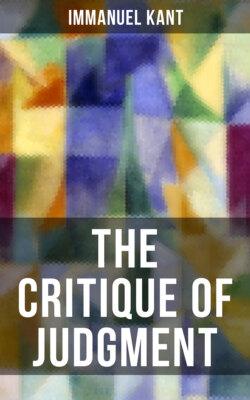Читать книгу THE CRITIQUE OF JUDGMENT - Immanuel Kant - Страница 8
На сайте Литреса книга снята с продажи.
III. OF THE CRITIQUE OF JUDGEMENT AS A MEANS OF COMBINING THE TWO PARTS OF PHILOSOPHY INTO A WHOLE.
ОглавлениеTable of Contents
The Critique of the cognitive faculties, as regards what they can furnish a priori, has properly speaking no realm in respect of Objects, because it is not a doctrine, but only has to investigate whether and how, in accordance with the state of these faculties, a doctrine is possible by their means. Its field extends to all their pretensions, in order to confine them within their legitimate bounds. But what cannot enter into the division of Philosophy may yet enter, as a chief part, into the Critique of the pure faculty of cognition in general, viz. if it contains principles which are available neither for theoretical nor for practical use.
The natural concepts, which contain the ground of all theoretical knowledge a priori, rest on the legislation of the Understanding.—The concept of freedom, which contains the ground of all sensuously-unconditioned practical precepts a priori, rests on the legislation of the Reason. Both faculties, therefore, besides being capable of application as regards their logical form to principles of whatever origin, have also as regards their content, their special legislations above which there is no other (a priori); and hence the division of Philosophy into theoretical and practical is justified.
But in the family of the higher cognitive faculties there is a middle term between the Understanding and the Reason. This is the Judgement, of which we have cause for supposing according to analogy that it may contain in itself, if not a special legislation, yet a special principle of its own to be sought according to laws, though merely subjective a priori. This principle, even if it have no field of objects as its realm, yet may have somewhere a territory with a certain character, for which no other principle can be valid.
But besides (to judge by analogy) there is a new ground for bringing the Judgement into connexion with another arrangement of our representative faculties, which seems to be of even greater importance than that of its relationship with the family of the cognitive faculties. For all faculties or capacities of the soul can be reduced to three, which cannot be any further derived from one common ground: the faculty of knowledge, the feeling of pleasure and pain, and the faculty of desire.9 For the faculty of knowledge the Understanding is alone legislative, if (as must happen when it is considered by itself without confusion with the faculty of desire) this faculty is referred to nature as the faculty of theoretical knowledge; for in respect of nature (as phenomenon) it is alone possible for us to give laws by means of natural concepts a priori, i.e. by pure concepts of Understanding.—For the faculty of desire, as a higher faculty according to the concept of freedom, the Reason (in which alone this concept has a place) is alone a priori legislative.—Now between the faculties of knowledge and desire there is the feeling of pleasure, just as the Judgement is intermediate between the Understanding and the Reason. We may therefore suppose provisionally that the Judgement likewise contains in itself an a priori principle. And as pleasure or pain is necessarily combined with the faculty of desire (either preceding this principle as in the lower desires, or following it as in the higher, when the desire is determined by the moral law), we may also suppose that the Judgement will bring about a transition from the pure faculty of knowledge, the realm of natural concepts, to the realm of the concept of freedom, just as in its logical use it makes possible the transition from Understanding to Reason.
Although, then, Philosophy can be divided only into two main parts, the theoretical and the practical, and although all that we may be able to say of the special principles of Judgement must be counted as belonging in it to the theoretical part, i.e. to rational cognition in accordance with natural concepts; yet the Critique of pure Reason, which must decide all this, as regards the possibility of the system before undertaking it, consists of three parts; the Critique of pure Understanding, of pure Judgement, and of pure Reason, which faculties are called pure because they are legislative a priori.
